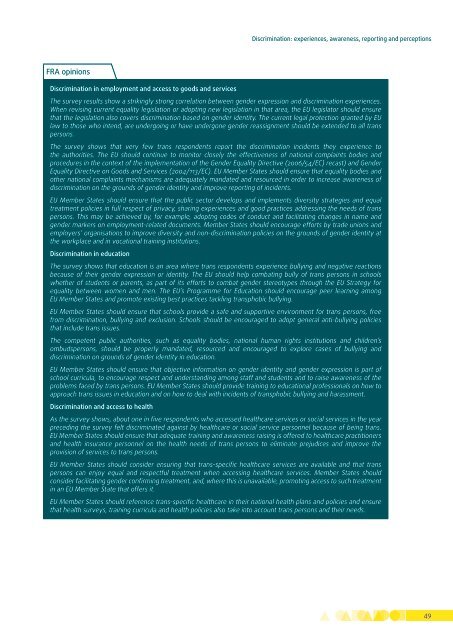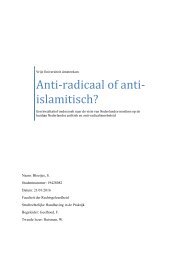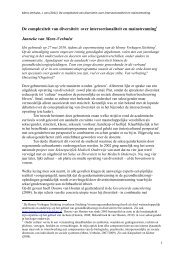fra-2014-being-trans-eu-comparative_en
fra-2014-being-trans-eu-comparative_en
fra-2014-being-trans-eu-comparative_en
Create successful ePaper yourself
Turn your PDF publications into a flip-book with our unique Google optimized e-Paper software.
Discrimination: experi<strong>en</strong>ces, awar<strong>en</strong>ess, reporting and perceptionsFRA opinionsDiscrimination in employm<strong>en</strong>t and access to goods and servicesThe survey results show a strikingly strong correlation betwe<strong>en</strong> g<strong>en</strong>der expression and discrimination experi<strong>en</strong>ces.Wh<strong>en</strong> revising curr<strong>en</strong>t equality legislation or adopting new legislation in that area, the EU legislator should <strong>en</strong>surethat the legislation also covers discrimination based on g<strong>en</strong>der id<strong>en</strong>tity. The curr<strong>en</strong>t legal protection granted by EUlaw to those who int<strong>en</strong>d, are undergoing or have undergone g<strong>en</strong>der reassignm<strong>en</strong>t should be ext<strong>en</strong>ded to all <strong>trans</strong>persons.The survey shows that very few <strong>trans</strong> respond<strong>en</strong>ts report the discrimination incid<strong>en</strong>ts they experi<strong>en</strong>ce tothe authorities. The EU should continue to monitor closely the effectiv<strong>en</strong>ess of national complaints bodies andprocedures in the context of the implem<strong>en</strong>tation of the G<strong>en</strong>der Equality Directive (2006/54/EC) recast) and G<strong>en</strong>derEquality Directive on Goods and Services (2004/113/EC). EU Member States should <strong>en</strong>sure that equality bodies andother national complaints mechanisms are adequately mandated and resourced in order to increase awar<strong>en</strong>ess ofdiscrimination on the grounds of g<strong>en</strong>der id<strong>en</strong>tity and improve reporting of incid<strong>en</strong>ts.EU Member States should <strong>en</strong>sure that the public sector develops and implem<strong>en</strong>ts diversity strategies and equaltreatm<strong>en</strong>t policies in full respect of privacy, sharing experi<strong>en</strong>ces and good practices addressing the needs of <strong>trans</strong>persons. This may be achieved by, for example, adoptng codes of conduct and facilitating changes in name andg<strong>en</strong>der markers on employm<strong>en</strong>t-related docum<strong>en</strong>ts. Member States should <strong>en</strong>courage efforts by trade unions andemployers’ organisations to improve diversity and non-discrimination policies on the grounds of g<strong>en</strong>der id<strong>en</strong>tity atthe workplace and in vocational training institutions.Discrimination in educationThe survey shows that education is an area where <strong>trans</strong> respond<strong>en</strong>ts experi<strong>en</strong>ce bullying and negative reactionsbecause of their g<strong>en</strong>der expression or id<strong>en</strong>tity. The EU should help combating bully of <strong>trans</strong> persons in schoolswhether of stud<strong>en</strong>ts or par<strong>en</strong>ts, as part of its efforts to combat g<strong>en</strong>der stereotypes through the EU Strategy forequality betwe<strong>en</strong> wom<strong>en</strong> and m<strong>en</strong>. The EU’s Programme for Education should <strong>en</strong>courage peer learning amongEU Member States and promote existing best practices tackling <strong>trans</strong>phobic bullying.EU Member States should <strong>en</strong>sure that schools provide a safe and supportive <strong>en</strong>vironm<strong>en</strong>t for <strong>trans</strong> persons, freefrom discrimination, bullying and exclusion. Schools should be <strong>en</strong>couraged to adopt g<strong>en</strong>eral anti-bullying policiesthat include <strong>trans</strong> issues.The compet<strong>en</strong>t public authorities, such as equality bodies, national human rights institutions and childr<strong>en</strong>’sombudspersons, should be properly mandated, resourced and <strong>en</strong>couraged to explore cases of bullying anddiscrimination on grounds of g<strong>en</strong>der id<strong>en</strong>tity in education.EU Member States should <strong>en</strong>sure that objective information on g<strong>en</strong>der id<strong>en</strong>tity and g<strong>en</strong>der expression is part ofschool curricula, to <strong>en</strong>courage respect and understanding among staff and stud<strong>en</strong>ts and to raise awar<strong>en</strong>ess of theproblems faced by <strong>trans</strong> persons. EU Member States should provide training to educational professionals on how toapproach <strong>trans</strong> issues in education and on how to deal with incid<strong>en</strong>ts of <strong>trans</strong>phobic bullying and harassm<strong>en</strong>t.Discrimination and access to healthAs the survey shows, about one in five respond<strong>en</strong>ts who accessed healthcare services or social services in the yearpreceding the survey felt discriminated against by healthcare or social service personnel because of <strong>being</strong> <strong>trans</strong>.EU Member States should <strong>en</strong>sure that adequate training and awar<strong>en</strong>ess raising is offered to healthcare practitionersand health insurance personnel on the health needs of <strong>trans</strong> persons to eliminate prejudices and improve theprovision of services to <strong>trans</strong> persons.EU Member States should consider <strong>en</strong>suring that <strong>trans</strong>-specific healthcare services are available and that <strong>trans</strong>persons can <strong>en</strong>joy equal and respectful treatm<strong>en</strong>t wh<strong>en</strong> accessing healthcare services. Member States shouldconsider facilitating g<strong>en</strong>der confirming treatm<strong>en</strong>t, and, where this is unavailable, promoting access to such treatm<strong>en</strong>tin an EU Member State that offers it.EU Member States should refer<strong>en</strong>ce <strong>trans</strong>-specific healthcare in their national health plans and policies and <strong>en</strong>surethat health surveys, training curricula and health policies also take into account <strong>trans</strong> persons and their needs.49









